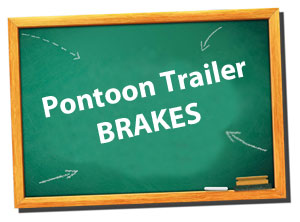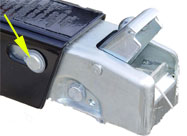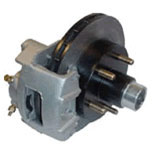 HOME |
|||
Brakes on Pontoon Trailers |
|||
|
There seems to be widespread
opposition by many customers
who don’t want to pay extra
for brakes on pontoon
trailers. “I’m not going to
trailer very far”, “the boat
isn’t that heavy”, “we only
trailer twice a year”, etc.
These were all valid reasons
for not wanting brakes. But
the average modern pontoon
weighs 2000+ lb. and deluxe
models commonly exceed 4000
lb. Only the largest SUV’s
and half ton pick up trucks
have enough “extra” braking
capacity to stop these kinds
of loads. There’s another problem with brakes on pontoon trailers that most people don’t think of. The old style drum brakes need service. The less you use them the more service they need. Water gets into the drums and if you don’t travel far enough to heat the brakes up, the water sits and corrodes the moving parts in the brake drums. The more you use a trailer with drum brakes the less trouble you’ll have. Most state brake laws require pontoon trailers that carry 3000 lb.to have brakes. That 3000 lb. figure means the overall load, not just the weight of the boat, but the weight of the boat and the trailer. The average 22’ tandem axle pontoon trailer weighs close to 1000 lb. so if you put a 2100 lb. pontoon boat on that trailer, in many states the law requires brakes. The state of Michigan requires tandem axle trailers to have brakes on both (or all) axles. Yet I'll bet that 75% of the brake trailers sold in Michigan only have single axle brakes. How you obey or disobey your local state laws regarding trailer brakes is your decision, although many new boat dealers are recognizing their liability in selling something that does not conform to state laws. |
|||
| All Pontoon trailers with drum brakes are not the same | |||
 The photo ato the left shows the difference between 10” and 7” brake drums. Most trailer manufacturers use 10” brakes, but some pontoon trailer builders still use 7” brakes. With 7” brakes you MUST brake all axles, there isn’t enough stopping power for today’s heavier pontoon boats. Small 7” brakes heat up more easily and with so much less surface to dissipate heat, they frequently fail. One other benefit of the larger 10” brake is that it’s an “automotive” style brake. If you have a problem you often can get parts locally. You’ll have trouble finding 7” brakes and parts anywhere except from the trailer manufacturer. |
|||
| Brake Actuators | |||
 |
|||
 Custom
trailer manufacturers often
use the “concealed” brake
actuator. It performs the
same function, but you don’t
have a big hunk of steel on
the tongue of the trailer. Custom
trailer manufacturers often
use the “concealed” brake
actuator. It performs the
same function, but you don’t
have a big hunk of steel on
the tongue of the trailer.Surge or hydraulic brakes are the standard of the boat trailer industry. They are popular because you don’t need brake controllers and special wiring in the tow vehicle. Electric brake controllers and wiring can add $200+ to the cost of trailer brakes. Hydraulic surge brakes are fully contained in the trailer. In a hydraulic brake system, the front of the coupler moves when the tow vehicle slows (brakes) and this sends brake fluid to the brakes to engage them. |
|||
| The modern concealed coupler shown works the same as the old clunky style without the big brake box. The modern concealed coupler is usually found on custom style or more expensive brands of pontoon trailers. It doesn’t really cost much more but, like LED lighting and radial tires, it costs something and some trailer manufacturers just won’t do the right thing if it adds an extra cost. | |||
| Backing up a pontoon trailer with Hydraulic Brakes | |||
 Old
style hydraulic brakes
frequently get bad reviews
for problems pertaining to
backing up. Especially when
backing up an incline. The
front of the coupler can be
compressed when backing up a
hill and the brakes are
applied. In older (or cheap)
brake systems this can still
be a problem. High quality
modern surge brake systems
have back-up lock outs to
prevent the system from
engaging when you back up. Old
style hydraulic brakes
frequently get bad reviews
for problems pertaining to
backing up. Especially when
backing up an incline. The
front of the coupler can be
compressed when backing up a
hill and the brakes are
applied. In older (or cheap)
brake systems this can still
be a problem. High quality
modern surge brake systems
have back-up lock outs to
prevent the system from
engaging when you back up.

Quality pontoon trailers built after 2013 may have a back up solenoid that also helps lock out the brakes when backing up. You’ll recognize this system by the 5 prong light hook up. The fifth prong works off the tow vehicles back up lights and energizes the back-up lock out solenoid. You won’t know this problem exists until the brakes lock up from sitting unused and you can’t move your tow vehicle and trailer. It’s worth asking about before you buy. |
|||
 Disc brakes were introduced on cars in 1950. It took until 1989 to see the widespread use in most cars (the trailer industry isn’t the only one to resist change). The internet has a wealth of information (search: disc brakes) about the benefits of disc braking systems. They stop quicker, don’t heat up, no springs to rust, or small parts to corrode. If you’re in salt water you must have disc brakes. If you tow frequently, the benefits of disc brakes are so outstanding that anyone should be willing to pay the little extra for disc versus drum brakes. Or if you’re towing infrequently it might be worthwhile not having to worry about drum brakes locked up from sitting. Disc brakes should be standard on pontoon trailers for larger heavier pontoons, but they cost extra and like LED lights and radial tires, some manufacturers just won’t use them. |
|||
| HOME | |||
| PONTOON TRAILERS 101 - FOR EVERYTHING YOU NEED TO KNOW ABOUT PONTOON BOAT TRAILERS | |||
